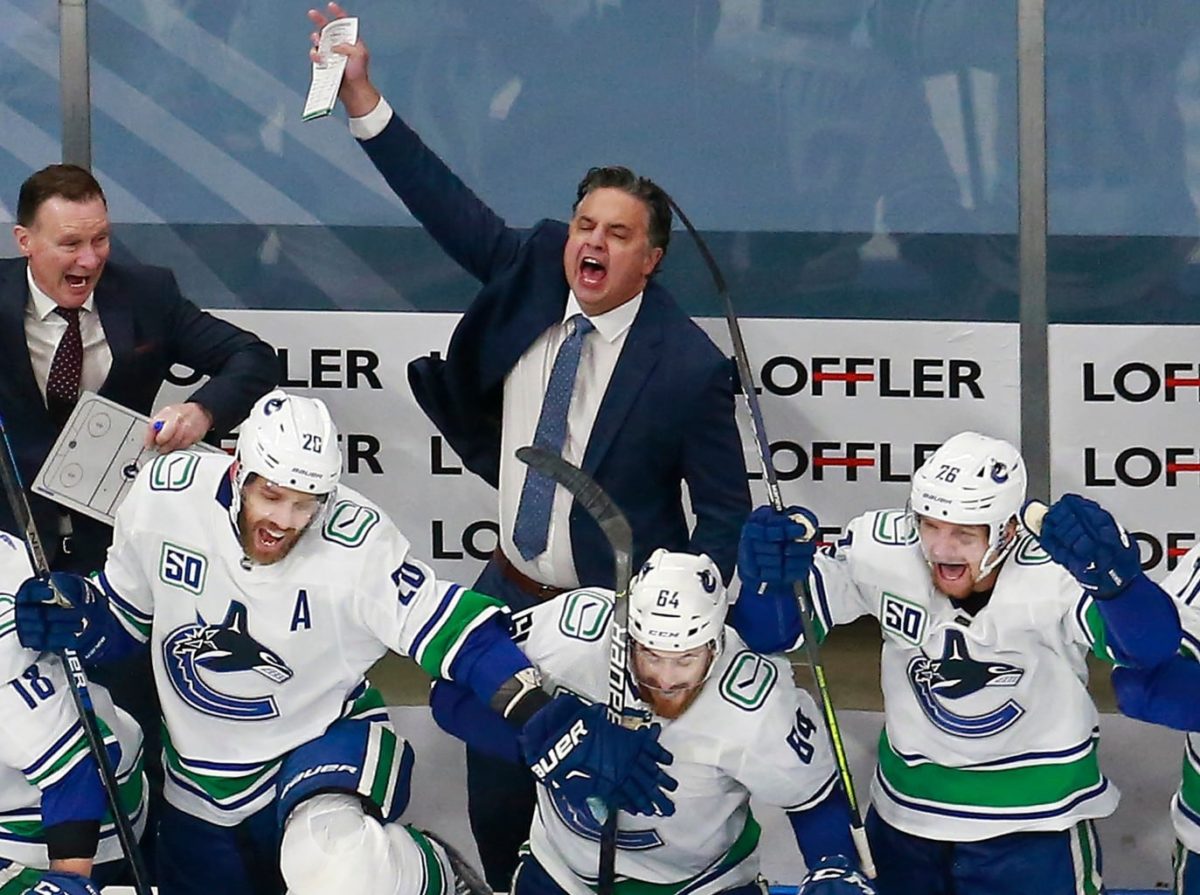If 2020 has taught us anything, it’s to expect the unexpected, especially in the sports world. Tom Brady in a Tampa Bay Buccaneers jersey. Seven-inning MLB games. The Stanley Cup in Canada. And due to a pandemic that has overstayed its welcome, 2021 will continue to throw us curveballs.
It seems the Vancouver Canucks will likely play in an all-Canadian division in 2020-21, because of the Canadian government’s border and travel restrictions in response to COVID-19.
That could entail battling their cross-country rivals, the Montreal Canadiens, Toronto Maple Leafs, and the Ottawa Senators, upwards of five times each. No one knows how this new layout will affect teams, but there are pros and cons to this approach.
Cons
Lack of Competition
After a season when 24 teams made the Stanley Cup Playoffs, the Canucks were the only Canadian club to make it past the Conference Quarterfinals. Only one championship banner has been raised in the Great White North since 1993, and that was for a basketball team. Rough seas make great sailors, and this division could be a lazy river.
That is not to say that the regular season will be a cakewalk. The Edmonton Oilers have arguably the two best players in the league. The Canadiens and Winnipeg Jets have deep rosters with Vezina Trophy winners in net. The Maple Leafs and Calgary Flames have the offensive firepower to light the lamp on any given night. Even the Senators improved significantly this offseason and could take a big leap.

At the end of the day, however, great teams get it done in the playoffs, and that just hasn’t happened north of the border recently. Whether the division is a dog fight or Vancouver comes out on top with ease, the Canucks will not be as primed for the postseason as American teams. The possible Central Division will five of the last six Stanley Cup winners. It may be a struggle to make the playoffs for those teams, but the ones who qualify will be ready for it when the time comes.
Getting Demko Ready
The Canucks are hopeful that they have their next franchise goaltender in Thatcher Demko, but this could be an extremely difficult season to make an accurate judgement. If he gets lit up, it doesn’t necessarily mean he wasn’t ready. It could simply mean that opponents learned more about him from shooting on him every week; insight they would never have in a normal season.
Similarly, a stellar season doesn’t automatically mean he’s ready to take the reigns either. Demko could just as easily pick up on shooter tendencies. He could learn to read Johnny Gaudreau and Auston Matthews like a book by season’s end, but there are plenty of other prolific goal scorers outside of the Canadian Division that could give the San Diego native fits come playoff time.

The Washington Capitals and New York Rangers don’t want to hear any complaining, as they’re also banking on young inexperienced goalies to lead their franchise. But with the possibility of losing Braden Holtby to the Seattle Kraken, the Canucks would really like to get a good read on Demko.
No Standout Matchups
Every season when the NHL schedule comes out, teams circle a few special games. In a typical regular season, the Canucks might have circled their first game against the Vegas Golden Knights, a Sunday matinee against the Minnesota Wild, or a five-game road trip to the East coast. Playing the same six teams for an entire season, even if it’s shortened, could make it difficult to get up for games after a few weeks.

In an 82-game season, there are plenty of opportunities for a team to find its identity and hit their stride. Maybe they show the league they can play with the best of the bunch in a victory over the defending champions. Maybe the team chemistry jumps to a new level over a trip against the three California teams. Maybe Holtby finds his rhythm in his first game against his former team. There are countless hypotheticals that can turn the tide of a season, but not so much in 2021.
Pros
Lack of Physicality
With the exception of the Jets, the knock on the Canadian teams has been their lack of physicality and grit. The Canadiens always seem to dress an undersized team. The Maple Leafs and Flames rely on their run-and-gun offense to get the job done but are annually outmanned in the first round of the playoffs.
The last three Stanley Cup winners all had the perfect combination of size and toughness with speed and skill. The Canucks’ prospective divisional opponents have the latter two qualities, but not so much the first two; and it could be a huge advantage. Vancouver was among the league leaders in man-games lost to injury in 2019-20 with over 250. They have the opportunity to stay healthy this season; and a completely fresh Canucks team in the postseason is a scary thought.
Less Travel
Vancouver is annually among the league leaders in distance travelled in a season. The introduction of the Canadian Division could cut down several thousand miles of flying for the team. More time spent at home with family and friends and less time on the team charter could do wonders for the mental health and wellbeing of players and the coaching staff come playoff time.
Mini-Series
Because three of the Canucks’ division rivals would be on the other side of the country, the NHL is considering an approach similar to the MLB, where teams play a mini-series when visiting. For a young core coming off their first NHL postseason, this type of schedule could translate nicely to being successful in April.
In a playoff series, as with an All-Canadian division, coaches and players will adapt to their opponents; learning to counter an aggressive forecheck, tweak the power play if it’s firing blanks or getting the right line matchups on the ice. A full regular season playing this style would help keep the mind sharp of a head coach with limited NHL playoff experience, and teach the Canucks’ youngsters to think and adjust on the fly.

How the 2020-21 season will unfold remains a mystery, and only time will tell. One thing is certain though: it will be the source of much controversy. Many feel that this past Stanley Cup should have an asterisk next to it due to the shortened regular season and expanded playoffs. A season where each team plays only six other teams throughout its entirety will surely be debated not only this year but for years to come.